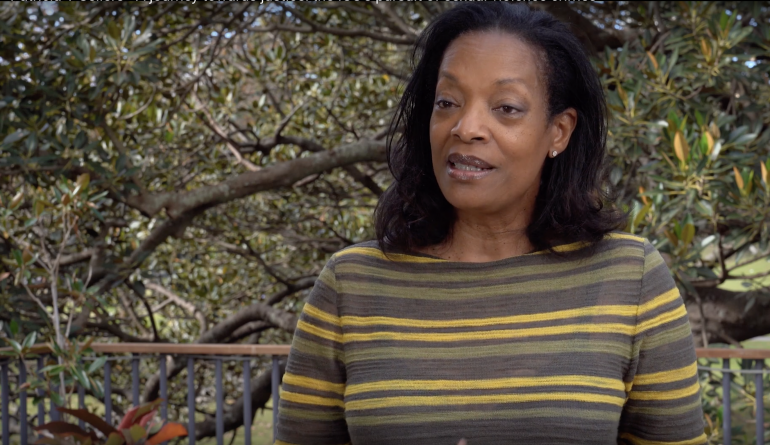Patricia V Sellers, special advisor on gender to the International Criminal Court (ICC), is ensuring gender analysis is at the heart of the fight to end impunity for genocide and war crimes, including sexual and gender-based violations.
Visiting Australia as the Australian Human Rights Institute’s Distinguished Visitor, and speaking in a personal capacity, rather than on behalf of the ICC, Ms Sellers adds that she is confident the Court will soon make its first convictions for sexual violence in its 20-year history.
Ms Sellers is one of many special advisors to the ICC, and the third advisor on gender. The role involves advising the office of the prosecutor, including the investigation and trial teams, on gender matters and how these relate to prosecution strategies and evidence gathering.
These issues include sexual violence, and analysing evidence that involves men, women, boys and girls. Gendered analysis of the evidence informs not just what the team might charge, but how it frames the atrocities that have taken place.
“We often think about war as ‘men shooting men’,” Ms Sellers says. “Even that is a gendered statement in and of itself.
“We should look at it a bit more carefully. It’s usually men of a certain age group, often men of a certain age within a certain ethnic group, often doing certain duties that might relate to their age or position in society.
“We can do a gender analysis of just the male to male part, but wars never entail just one gender.
“We have perpetrators, we have victims of crimes who could be male or female, of childhood age or adult age. Think of child soldiers, think of persons forced to flee.
“What’s our gender analysis of the fleeing population? And let’s say it’s a fleeing population of young children. Why?
“There might be a gender analysis taken of a school, the school has been attacked, so now we look and say, we have boys and girls fleeing, maybe being forcibly transferred, maybe being recruited as child soldiers, maybe themselves becoming victims of crimes that are sexually-based, psychologically based, physically based.
“That’s the sort of gender analysis we offer to the prosecutor through investigation or through the submission of arguments before the Court and the writing up of legal text and we hope the judges will be convinced and adjudicate in our favour.”
The importance of gender analysis to the ICC was established in the courts that preceded it, Ms Sellers says.
The first international criminal courts after the Nuremberg trials were the Yugoslavia and Rwanda tribunals, where Ms Sellers was a prosecutor and legal advisor for gender.
“The experience of bringing gender into the centre of how the Court was to eventually bring justice, became evident, and I believe the International Criminal Court then realising that, has incorporated a gender focus and gender policy.”
Observers of the International Criminal Court are disappointed that it has had no successful convictions of sexual violence to date, however, Ms Sellers says it’s important to look at the cases heard so far.
In the first case, the lengthy trial of Thomas Lubanga Dyilo, from the Democratic Republic of Congo, sexual violence was not among the charges. In the cases of Germain Katanga and Mathieu Ngudjolo Chui, the judges acknowledged credible evidence of sexual slavery and rape, but said it didn’t link to the accused.
The first case to include charges and a conviction for crimes of sexual violence against women and men was the trial of Jean-Pierre Bemba Gombo, former vice-president of the Democratic Republic of Congo.
In March 2016, Bemba was found guilty of crimes against humanity and war crimes, including rape, and sentenced to 18 years imprisonment. The ICC found the crimes that took place in 2002/3 in the Central African Republic resulted from Bemba’s failure to exercise control over the militia he commanded – but the entire conviction was overturned on appeal.
“There are two or three more cases coming up through the trial stage right now, who have been charged and have pleaded sexual violence,” Ms Sellers says.
“I believe we will have those convictions, particularly to sexual slavery, child soldiers, forced pregnancy. We hope in this coming year the judgements will be rendered in our favour.”
Ms Sellers stresses that bringing prosecutions to a successful conclusion involves a number of stages – from securing strong evidence, protecting witnesses who provide that evidence and assisting them to return safely to their communities, and presenting good arguments before the judges.
“It’s after that process that a court may adjudicate in your favour, and then you have to go to appeal,” Ms Sellers says.
“It’s quite a process. At the end of that process, there might be funds from the Victim’s Fund that are awarded. But we’re really describing something that takes years, and every stage is vital and important, and based on gender competent analysis.”
Feminist civil society groups and academia continue to play a critical role in strengthening the institution’s work in seeking justice for victims of gender-based violations.
“If international criminal law doesn’t respond to everyone who is a human being, then it’s not really doing its function. We’re supposed to be safeguarding and protecting.”
Ms Sellers was a special guest speaker at ‘Remembering Rwanda: A journey towards Justice and Reconciliation’ a day of discussions with academics, practitioners and experts considering the challenges and achievements of the ICTR, its relevance for other accountability mechanisms and themes of reconciliation and healing. To see the program, click here.
To listen to Ms Sellers' interview on ABC Radio National Breakfast, click here
